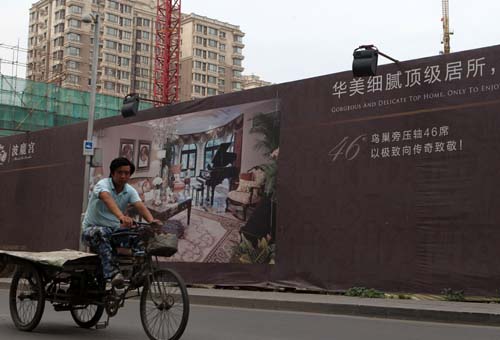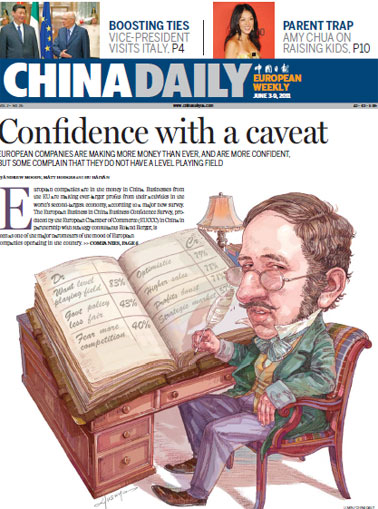Companies
Exaggerated property ads get hostile response
Updated: 2011-06-08 16:26
By Li Yao (China Daily)
|
 |
|
A tricycle passes an advertisement for a real estate project that reads "gorgeous and delicate top home" in Beijing. [Photo/China Daily] |
Beijing - Exaggerated advertising claims for high-end properties targeting the super rich in China have come under widespread criticism for encouraging people to flaunt their wealth and for deliberately using misleading language.
Property advertisements boasting of a luxurious and refined lifestyle, using phrases such as "exclusively for royal dignitaries", "first-rate villas and aristocrat territory", have been widely adopted by developers to attract potential purchasers.
| ||||
"Words like 'best' or 'most' are not allowed, but a little extravagant flair will be accepted if it is a truthful description," he said.
However, he advised buyers to take advertisements as a general reference and not to get carried away by their alluring words.
Xia Ya, owner of a real estate research studio in Beijing, said the overuse of advertising language associated with palaces, royal residences and exotic landmarks, has made such words and phrases lose their impact and many buyers have become indifferent to them.
"If the property is found to be not as good as advertised, it is the developer's reputation that is hurt most," he said.
But he added that some high-end properties are tailored to woo the wealthy and have superior design and build quality and a better location, which justifies a few hyperbolic advertisements.
While Xia said he saw the merit of government intervention in preventing fraud in real estate advertising, he objected to a cleansing of exaggerated property advertisements. He said the more pressing tasks for government authorities should be to remind the public of rational purchasing and to narrow the widening income gap, which is what triggered the hostile reaction to such advertisements in the first place.
Chen Pei'ai, a professor at Xiamen University in Fujian province, agreed that there is a market, however small, targeted by property advertisements boasting lavish living, but the challenge for developers is to present their luxurious real estate truthfully.
"Putting too much subjective impression in advertisements is a bad idea. Advertisers should present the truth, and leave the potential purchaser to make their own judgment after seeing the properties," he said.
One Internet user under the name "Jinshanxiaoqian888" posted a translation of some of the commonly used advertising jargon, for instance, a house in baroque style simply means it has a round roof, and a house in gothic style refers to a pointed roof.
E-paper

Harbin-ger of change
Old industrial center looks to innovation to move up the value chain
Preview of the coming issue
Chemical attraction
The reel Mao
Specials

Vice-President visits Italy
The visit is expected to lend new impetus to Sino-Italian relations.

Birthday a new 'starting point'
China's national English language newspaper aims for a top-notch international all-media group.

Sky is the limit
Chinese tycoon conjures up green dreams in Europe with solar panels




